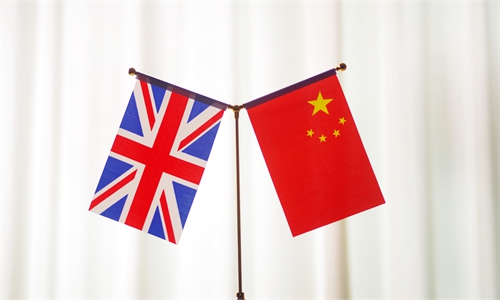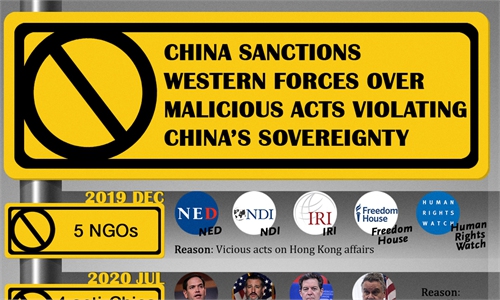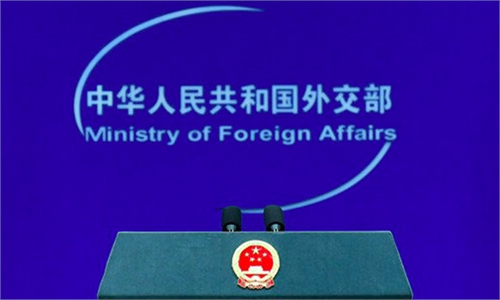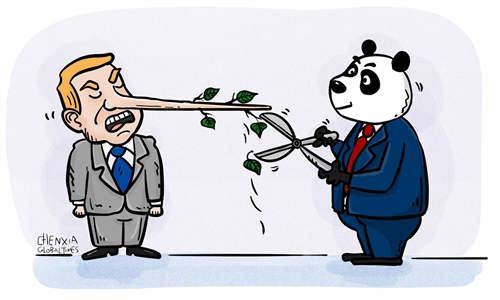
The Chinese Foreign Ministry in Beijing Photo: Xinhua
A coalition of countries at the behest of the US, including the European Union, Britain and Canada, recently imposed sanctions on several officials of the Standing Committee of the CPC Xinjiang Uygur Autonomous Regional Committee and the Xinjiang Public Security Bureau for engaging in "human rights abuse" of the Uygur population. Beijing responded by imposing a series of retaliatory sanctions on each side, a response which went further and harsher than the initial measures. Although inevitably the Western media decried China's response illogically as a form of aggression and claimed it would further distort its ties with the various countries involved, it was demonstrative of the extent Beijing is prepared to go in order to defend its national sovereignty and enforce its "red lines" accordingly.The West does not seem to understand that owing to the experience of history, national sovereignty is an extremely sensitive issue for China. Having faced the legacy of Western powers continually violating, disrespecting and interfering in the country's sovereign interests and territorial integrity, modern China has been forced to take an unwavering resolve in defending its sovereign rights at all costs and to draw harsh "red lines" simply because the West will not respect them otherwise.
The West's relationship with China is premised on the ideological disposition that Beijing is fundamentally unequal. The West reserves a position to impose its worldview upon China, but doesn't afford Beijing any legitimacy to question it. Therefore, deterrence by forceful means is the only language the West will understand in order to protect China's core interests. This is not about authoritarianism; it is about alleviating a fundamentally unequal power relationship.
China has always been prepared to forego short-term costs on itself in order to defend its long-term positions. If the West is going to attempt to whip up instability within Xinjiang by attempting to economically isolate it, formulate ethnic unrest and spread atrocity propaganda to undermine China's international reputation, then Beijing is prepared to hit back, and hit harder.
For example, there has been a great deal of news coverage concerning the Comprehensive Agreement on Investment (CAI) China had negotiated with the European Union after the sanctions row. Although a lot of US-sponsored think tankers sought to sabotage it anyway, the media discourse talks about this as if it is something Europe "holds over China," as if Beijing is desperate and as if China has completely burnt its bridges in retaliating to Xinjiang sanctions, readily ignoring the reality that Europe itself had been trying hard to seek more market access within China.
However, China is unwilling to trade away its sovereignty for agreements like the CAI. There can be no compromise. Imposing parties cannot simultaneously demand to exploit China's domestic markets while readily undermining its political interests. This is not the 19th century. Therefore, in responding to the European Union and others, Beijing has opted for the logic of deterrence in order to defend its interests; the question of the Chinese market is simply irrelevant on the scale of priorities. Thus, while the mainstream media constantly espouses a one-sided narrative that China's responses are generating a "backlash" or being labelled with the misleading Orientalist trope of the so-called wolf warrior diplomacy, they are completely missing the point. This is not one-way aggravating; China is reacting and imposing costs in direct response to Western aggression.
There is evidence that China's cost-based deterrence is working. When the coordinated sanctions from US allies targeted China over the Xinjiang-related issues, one may note that Australia and New Zealand did not join in despite their loyalty to the Five Eyes alliance. Why so? Canberra has learned the hard way that if it directly antagonizes China at the behest of the US, it will suffer costs. New Zealand, likewise as a smaller country which also depends deeply on the Chinese market, has also learned from this experience. While they offered a lukewarm statement supporting the measures, they did not follow suit. Likewise, following sanctions upon British individuals in response to Western sanctions, the Essex Court Chambers in the UK subsequently erased a "genocide opinion" on the matter of Xinjiang. This is another sign that China's approach is rational. This is not about "silencing people" or "suppressing freedom," this is about utilizing force to uphold China's interests in an ideational relationship which, as noted, is fundamentally unequal.
In summary, China is not seeking to "dominate" or "coerce" the West, but to simply protect its own sovereign rights and be treated with respect concerning its core interests, following an extensive history right up to this day, during which it has been treated with disrespect. The West believes they have a right to impose their will on China, to undermine its national sovereignty, to divide the country and to readily exploit it economically at the same time. Beijing is responding to growing hostility by doing what it has in fact always done to protect its national sovereignty. If the West push against the boundaries on these key issues, China will respond whenever and wherever necessary and impose costs on the offending countries to create a logic of deterrence. It's time to question the conventional narrative of who the aggressor is here.
The author is a British analyst of political and international relations and graduate of Durham and Oxford universities. opinion@globaltimes.com.cn




